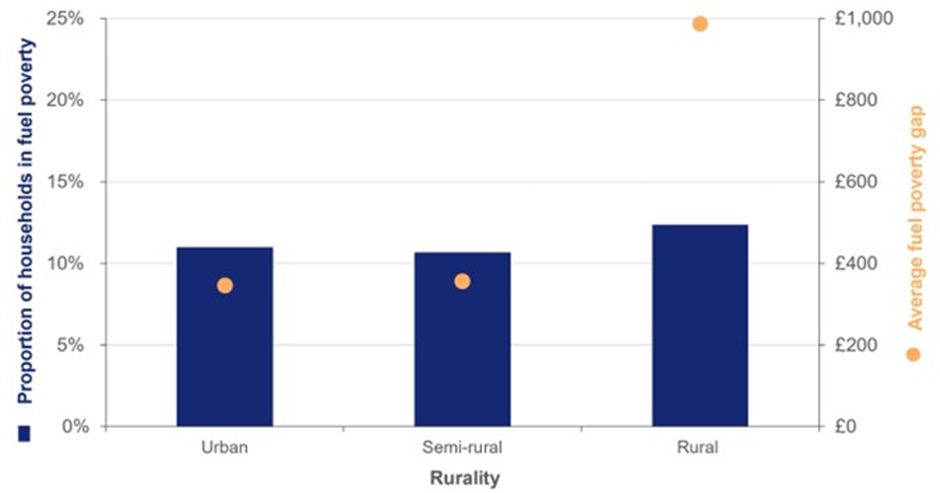T: 01822 851370 E: [email protected]
Visit RSN Survey about life in rural England to find out more.
Addressing the Unique Challenge of Fuel Poverty in Rural Areas
 In the latest fuel poverty update from the Department for Energy Security and Net Zero, a concerning pattern emerges in England's rural communities. These areas are grappling with the highest rates of fuel poverty at 12.3%, surpassing both semi-rural (10.6%) and urban (11.0%) rates. A key factor exacerbating this issue is the energy inefficiency in rural homes, which average a median fuel poverty energy efficiency rating of only 64, considerably below the national average of 70.
In the latest fuel poverty update from the Department for Energy Security and Net Zero, a concerning pattern emerges in England's rural communities. These areas are grappling with the highest rates of fuel poverty at 12.3%, surpassing both semi-rural (10.6%) and urban (11.0%) rates. A key factor exacerbating this issue is the energy inefficiency in rural homes, which average a median fuel poverty energy efficiency rating of only 64, considerably below the national average of 70.
Rural homes are not only larger, with a median floor area of 115m^2 compared to the overall median of 85m^2, but also more expensive to heat, leading to an annual median fuel cost of £2,740. This contributes to a pronounced fuel poverty gap of £987, highlighting the financial strain many rural households endure just to maintain a basic standard of warmth and energy.
Despite a slight national decrease in fuel poverty rates—from 11.4% in 2023 to 11.0% in 2024—rural areas have witnessed less improvement, accentuating the pressing need for specific attention. The challenges unique to rural settings include limited access to advanced energy solutions and reliance on outdated heating technologies.
Enhancing the energy efficiency of rural homes through upgrades tailored to their larger sizes and unique structural characteristics is essential. Additionally, increasing access to renewable energy sources and modern heating technologies could significantly reduce running costs and improve living standards in these communities.

Figure 3.12: Households living in rural areas had a slightly higher rate of fuel poverty and a much larger average gap.
This figure from page 36 of the report illustrates the stark differences in fuel poverty rates and gaps between rural, semi-rural, and urban areas. The Graph shows that Households living in rural areas had the highest fuel poverty rate of 12.3 per cent and the largest fuel poverty gap at £987.
Participate in the Fuel Poverty Strategy Consultation Before It Closes
In response to these pressing issues, the government is currently reviewing the Fuel Poverty Strategy and has opened a consultation which concludes this week. This represents a crucial opportunity for stakeholders, particularly from rural areas, to express their specific challenges and suggest tailored solutions. We urge all members of the RSN to visit the consultation webpage and make your voices heard before the deadline this week.
 |
Kerry Booth, Chief Executive, Rural Services Network:
|



